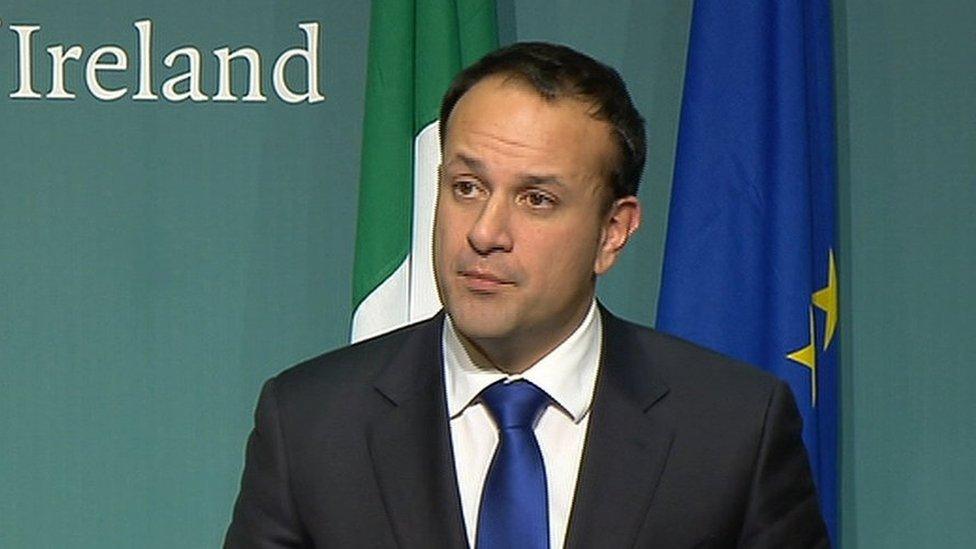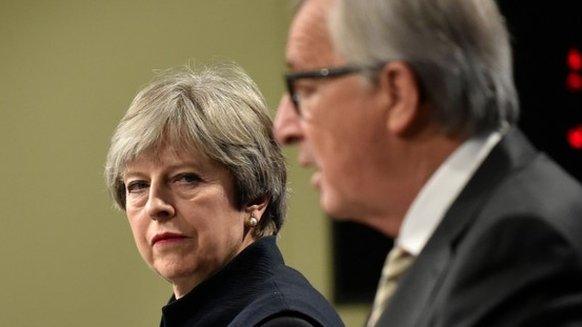No misunderstanding of Brexit text - DUP
- Published
- comments
DUP accuses Dublin of trying to change the Good Friday agreement unilaterally
The Democratic Unionist Party "had no misunderstanding" about the text of a UK-EU agreement on the Irish border, one of its MPs has said.
The Conservative Party was aware of the DUP's opinion, said Jim Shannon - one of 10 DUP MPs on whose support the UK government relies on to stay in power.
On Monday, Brexit talks between the UK and the EU broke up because of DUP objections to border proposals.
The DUP does not want NI border laws to be any different from Great Britain's.
Party leader Arlene Foster will not be going to London on Tuesday for talks on the issue, despite being invited to a meeting with Prime Minister Theresa May.
Instead, deputy leader Nigel Dodds will meet government chief whip Julian Smith.
Unionists tend to view with scepticism any proposal for harmonisation of rules on either side of the Irish border, says BBC News NI political editor Mark Devenport.
They are concerned such an approach may be the thin end of a wedge towards Irish unity.
DUP leader Arlene Foster spoke to Mrs May on Monday shortly after telling supporters she would not allow a Brexit deal that creates "regulatory divergence" between Northern Ireland and Britain, Reuters news agency reported.
A party source declined to reveal the content of the telephone call, but said the DUP was in continuing contact with Mrs May, added the agency.
Irish Minister for Foreign Affairs Simon Coveney has said his government wants to give Mrs May time and space to manage "difficult political issues".
Text 'was agreed'
Disagreement over the post-Brexit operation of the Irish border is currently holding up trade talks, with the Irish government saying negotiations cannot move on until it has a firm, written assurance from the UK that there will be no physical border on the island of Ireland.

Analysis
By Mark Devenport, BBC News NI political editor
The DUP says it never assented to any of the wording which leaked out of the Brexit discussions, whether it be "no regulatory divergence" across the island of Ireland after Brexit or "continued regulatory alignment".
Those words were meant to provide reassurance to the Irish government that, should the EU and the UK not be able to reach a trade deal, there would be a backstop that would guarantee trade across the border would continue pretty much as it does now.
It would mean Northern Ireland businesses adhering to the same standards and rules as their southern counterparts.
However, unionists tend to view with scepticism any proposal for harmonisation of rules on either side of the border.
They are concerned such an approach may be the thin end of a wedge towards Irish unity.

Taoiseach (Irish Prime Minister) Leo Varadkar said the British government had agreed the text of a deal which was satisfactory to his government on Monday morning.
However, he said it was evident that "things broke down and became problematic" by lunchtime.
Irish PM Leo Varadkar said he was "surprised and disappointed"
The BBC understands the deal broke down after the DUP refused to accept UK concessions on the Irish border.
"We're part of the United Kingdom of Great Britain and Northern Ireland," Mr Shannon told the BBC.
"So when it comes to regulatory divergence which separates Northern Ireland, politically and economically from the rest of the United Kingdom, we cannot have that."
"The referendum was very clear when it was held back in June 2016," he said, referring to the UK's vote to leave the EU.
"We're all leaving together. We're in it together, we're leaving it together and I think the quicker we come to some sort of understanding with the Republic of Ireland, the better."
'Shambles'
Asked if there had been a miscalculation or a misunderstanding between the DUP and Mrs May's government, Mr Shannon said the DUP's stance had been very clear.
Citizens' rights, the Irish border and money are the three big negotiation points
"There was no misunderstanding from our point of view," he said.
"There were enough of those in the Conservative Party [who] knew our opinion.
"They understood where we were in relation to this issue and they withdrew the suggestion for an agreement which was put forward."
The DUP has a confidence-and-supply arrangement with the minority Conservative government, which means Mrs May relies on them to support her government in House of Commons votes.
'Not sensible'
Brian Hayes, an MEP for ruling Fine Gael party in the Republic of Ireland, criticised the DUP approach.
"Putting guns to people's heads is never a sensible thing to do in politics, it's certainly not sensible, centre ground politics," he said.
"What's important here is that we get back to the text, and if there are some words that can help people, fine, but they cannot be a diminution of what we have.
He added: "We have effectively a text and I think it would be a shame, at this stage, for that deal to unravel in a circumstance where the only objective of the Irish government and the EU is to make sure we don't have a hard border into the future, which is something I know Ulster unionism, the DUP and everyone else wants to achieve."
Meanwhile, a pro-Brexit Conservative MP has claimed the the text of an EU-UK agreement on the Irish border was leaked by the Irish government in an attempt to "bounce" Mrs May from Downing Street.
Wellingborough MP Peter Bone made the claim in the Express newspaper, external.
Asleep at the wheel?
The Ulster Unionist Party's chairman, Lord Empey, described the handling of the situation by the Tories and the DUP on Monday as a "shambles".
He said there could only be two scenarios.
"Either the DUP (leaders) were not consulted in advance by the Government, in which case they are not as influential as they say," said Lord Empey.
"Or, they were consulted but didn't appreciate the full implications of the leaked document and were asleep at the wheel."
The SDLP accused the DUP of being "terrible unionists" because they were "vetoing something that the London government wants" in the Brexit talks.
SDLP MLA Claire Hanna said that in their rows with the Tories over the Irish border, DUP negotiators were "cutting off their noses to spite their faces".
"If the DUP have a better idea, let's hear it," she said.
Stephen Farry of the Alliance Party described Monday's events as a "shambles".
"It's a shambles because we're potentially going to pass up one of the best opportunities to not only survive Brexit in terms of Northern Ireland, but to actually have a real opportunity to position ourselves as a bridge both to the market in Great Britain, but also to the European Union."
- Published5 December 2017
- Published4 December 2017

- Published4 December 2017
